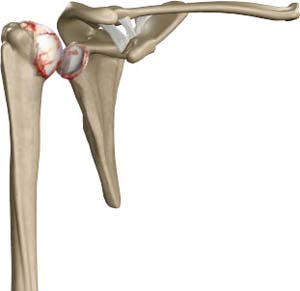
Shoulder Arthritis Specialist
Arthritis of the shoulder can cause pain, stiffness, limited range of motion, and a loss of shoulder strength. Dr. Brody Flanagin is a shoulder arthritis specialist in Dallas, Texas and offers both conservative and surgical treatments for shoulder arthritis. Contact Dr. Flanagin’s team to know more about your treatment options.

Shoulder Arthritis - Chronic Shoulder Pain (Dallas, TX)
About Shoulder Arthritis
Patients from all across Dallas, TX visit Dr. Flanagin on a routine basis to help manage the symptoms of shoulder arthritis and in many cases treat the condition with either conservative/non-operative or surgical methods.
Arthritis of the shoulder is one of the most common degenerative diseases associated with joints. It affects about 20% of adults and can be extremely painful if not managed properly. While shoulder arthritis generally does not appear until the later years (50 and older), symptoms can start much sooner, especially for individuals who have used their shoulders consistently throughout their life. This “wear and tear” and overuse of the joint is seen among baseball and basketball players, golfers, and those who work in certain fields where heavy lifting is involved.
There are several types of shoulder arthritis, each with its own distinct treatment protocols:
- Degenerative: Also known as osteoarthritis, this is the most common form of arthritis seen among active adults. It is degenerative condition caused by wear and tear and occurs when the articular cartilage that surrounds the joint begins to thin and slowly disappear. This type of arthritis is often seen in the AC joint as well as the glenohumeral (“ball and socket”) joint.
- Rheumatoid: This particular arthritis is often hereditary. It can affect any aspect of the shoulder and generally affects both shoulders. It is an autoimmune disorder, causing severe inflammation of the joint lining and degeneration of the cartilage over time.
- Post-Traumautic A serious shoulder injury, such as a dislocation, rotator cuff tear, or a fracture can cause arthritis in the later years. Even if the shoulder injury is treated and repaired, post-trauma arthritis can present itself in the form of osteoarthritis.
symptoms of shoulder arthritis
The most common symptom among patients with shoulder arthritis is shoulder pain. This constant, dull ache is usually deep inside the shoulder and ranges between periods of intense pain to episodes where the pain is diminished. Sometimes patients describe the sensation of grinding in the shoulder with movement. Physical activity, overuse, and certain movements can aggravate the condition causing symptoms to flare up, creating sharp pain that worsens unless medication or treatment is sought. Those with shoulder arthritis sometimes find it hard to sleep on the side of the affected shoulder, and for some individuals, limited range of motion, stiffness, and a loss of shoulder strength will also occur. Some patients will also find that their shoulder seems unstable, and may make clicking or popping noises with certain movements.
Types of Shoulder Arthritis
The most common types of shoulder arthritis are:
- Primary Shoulder Arthritis
This is a joint disease of the glenohumeral joint that is caused by degeneration, rheumatoid arthritis, or from a prior surgery or injury. It is not affiliated with another injury, such as a rotator cuff tear. Shoulder arthritis of this nature comes on slowly and continues to worsen over time.
- Rotator Cuff Arthropathy
Rotator cuff arthropathy is shoulder arthritis that evolves due to a rotator cuff tear or dysfunction within the rotator cuff tendons. It is typical among patients who have had chronic rotator cuff injuries that may or may not have previously had surgery or reconstruction of the tendons. This arthritis can result in extreme shoulder pain for the patient and can also lead to progressive degeneration and destruction of the glenohumeral joint. Some patients will need additional surgery and in severe cases a reverse total shoulder replacement may be necessary to relieve pain.
- AC Joint Arthritis
Arthritis of the AC joint is essentially degeneration of the cartilage and tissue that surrounds the acromioclavicular joint. This is the bony structure at the top of the shoulder where the shoulder blade meets the collarbone. Arthritis in this area of the shoulder is very common. It can also create abnormal bony growths (known as osteophytes), as well as bone spurs within the joint. This type of arthritis typically develops after an injury. It can irritate other areas of the shoulder, such as the tendons that make up the rotator cuff, and can also lead to impingement or frozen shoulder (the inability to move the arm or maintain mobility and motion).
Treatment Options
Because there are varying types of shoulder arthritis, affecting different parts of the shoulder joint, treatment will depend on the severity and location of the condition. Many patients are able to live with the symptoms for a number of years before seeking medical treatment.
- Nonsurgical
The first course of treatment would generally start as a nonsurgical approach, which would include anti-inflammatory medications, cortisone (steroid) injections, and other medications to relieve pain. Exercises that can be performed at home will help to improve and maintain strength and motion. This is important because individuals with shoulder arthritis tend to suffer from stiffness and limited range of motion. Patients should also understand what exacerbates their pain and limit or avoid certain activities so that a flare-up does not occur.
- Surgical
For those who suffer from chronic arthritis where nonsurgical approaches are not enough to limit pain, surgery is available. Arthroscopic surgery to remove bone spurs and fragments can sometimes help with shoulder pain. This same technique can also address degenerative cartilage by removing inflamed tissue and lining of the joint. Shoulder replacement surgery is a procedure reserved for the most severe cases. This surgery, while invasive, has excellent results for sufferers of long-term and severe shoulder arthritis. Advanced surgical techniques and surgeon skill can produce a great outcome for patients, eliminating pain and restoring function and use of the arm.
Treat Your Pain Today
If you have lived with shoulder pain long enough, and are ready to seek effective treatment, please contact our orthopedic office to schedule your appointment. Shoulder arthritis sufferers should find relief knowing that their pain can be managed and diminished significantly with treatment. In addition to a thorough physical exam, our staff of trained professionals will provide digital imaging and X-rays to further analyze your condition. Please rest assured that the appropriate treatment will be recommended so that you can live a pain free and active life. We look forward to hearing from you.
*Individual results are not guaranteed and may vary from person to person. Images may contain models.




